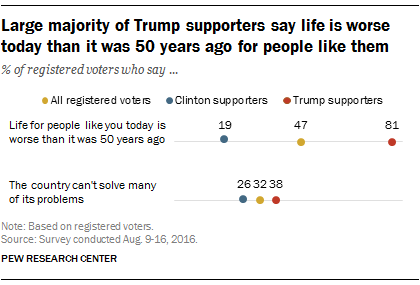
Voters who support Hillary Clinton and Donald Trump agree on at least one thing – that they not only differ on plans and policies, but also on “basic facts.” Their disagreements on issues extend to the nation’s progress and its ability to solve problems.
In August, a much greater share of Trump supporters (81%) than Clinton supporters (19%) said “life in America today is worse than it was 50 years ago” for people like them. And overall, about a third of registered voters said the country can’t solve many of its problems, but more Trump supporters (38%) than Clinton supporters (26%) said this.
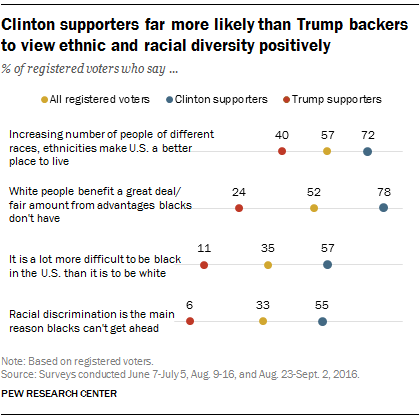
Clinton supporters were much more likely than Trump supporters to feel positively about the country’s increasing diversity, however. Nearly three-quarters (72%) of those who backed Clinton said the increasing number of people of different races, ethnic groups and nationalities makes the U.S. a better place to live. Fewer than half of Trump supporters (40%) agreed.
In July, 78% of Clinton supporters said that white people benefit “a great deal” or “a fair amount” from advantages in society that black people don’t have, and 57% said it is “a lot” more difficult to be black than it is to be white in the U.S. Only about a quarter of Trump supporters (24%) said that white people benefit at least a fair amount from advantages blacks don’t have; just 11% said it is a lot more difficult to be black than it is to be white in this country.
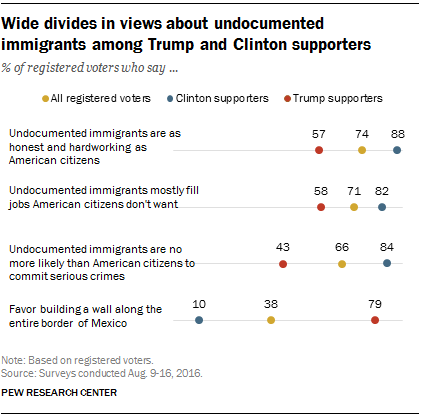
Immigration has been a central issue in this campaign, and in August, Clinton and Trump supporters expressed differing views on both immigration policies and undocumented immigrants.
Clinton supporters were more likely than Trump supporters to say that undocumented immigrants are as honest and hardworking as American citizens (88% of Clinton supporters, 57% of Trump supporters), and that undocumented immigrants are no more likely than citizens to commit serious crimes (84% of Clinton supporters, 43% of Trump supporters).
And Trump supporters were nearly eight times as likely as Clinton supporters (79% vs. 10%) to favor building a wall along the entire U.S. border with Mexico.
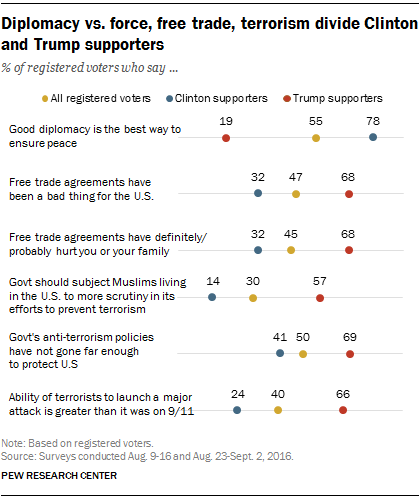
Disagreements also exist on foreign policy issues such as free trade and terrorism.
Those who say they plan to vote for Trump were much more likely than Clinton supporters to say that free trade agreements have been a bad thing for the U.S. (68% of Trump supporters, 32% of Clinton supporters), and that free trade agreements have probably or definitely hurt them or their families (68% vs. 32%).
And when it comes to efforts to prevent terrorism, a majority (57%) of Trump supporters said the government should subject Muslims living in the U.S. to additional scrutiny, while just 14% of Clinton supporters agreed.
In early September, most Trump supporters (69%) said their greater concern with anti-terrorism policies was that they have not gone far enough to protect the country (just 18% said they have gone too far in restricting civil liberties). Fewer than half (41%) of Clinton supporters said their greater concern was that policies have not gone far enough in protecting the country. And Trump supporters (66%) were far more likely than Clinton supporters (24%) to say that the ability of terrorists to launch a major attack today is greater than it was at the time of the Sept. 11 attacks.
Supporters of each candidate also disagree about the size and scope of the federal government.
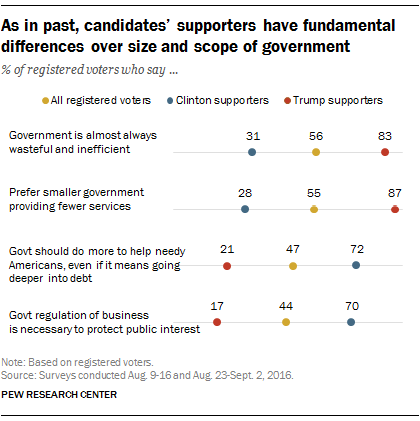
Clinton supporters were much more likely than Trump supporters to say that the government should do more to help needy Americans even if it means going deeper into debt (72% of Clinton supporters vs. 21% of Trump supporters), and they were more likely to say that government regulation of business is necessary to protect the public interest.
By contrast, far more Trump than Clinton supporters preferred a smaller government that offers fewer services (87% vs. 28%). And Trump backers also were more likely to view government as wasteful and inefficient: 83% said this, compared with 31% of Clinton supporters.
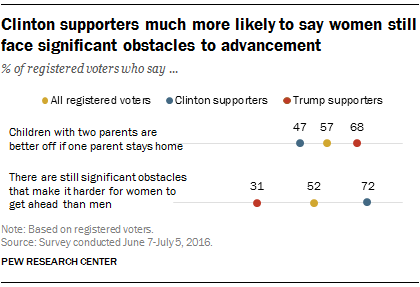
In July, there were substantial divides between the supporters of each candidate regarding gender issues. More than twice as many Clinton supporters (72%) than Trump supporters (31%) said that there are still significant obstacles that make it harder for women than men to get ahead.
These differences in opinion also extend to views of parenting. A greater share of Trump supporters (68%) than Clinton supporters (47%) said that children with two parents are better off when a parent stays home to focus on the family.